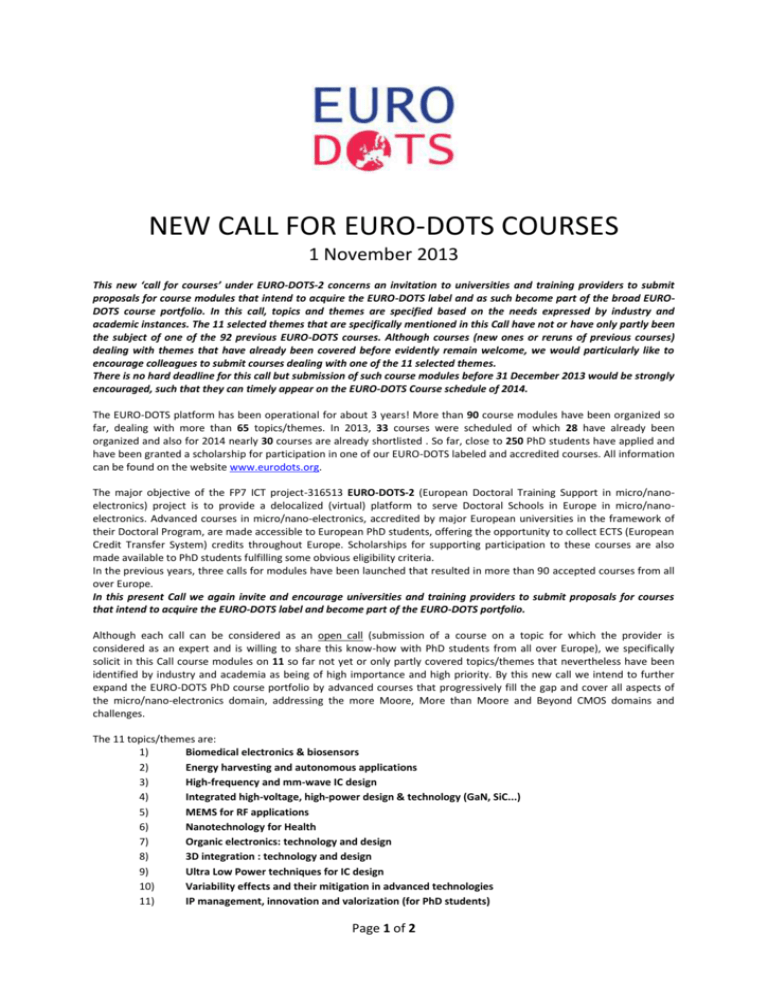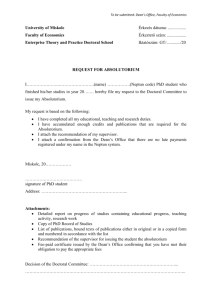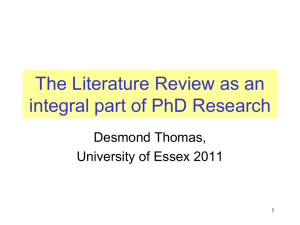NEW CALL FOR EURO-DOTS COURSES 1 November 2013 This
advertisement

NEW CALL FOR EURO-DOTS COURSES 1 November 2013 This new ‘call for courses’ under EURO-DOTS-2 concerns an invitation to universities and training providers to submit proposals for course modules that intend to acquire the EURO-DOTS label and as such become part of the broad EURODOTS course portfolio. In this call, topics and themes are specified based on the needs expressed by industry and academic instances. The 11 selected themes that are specifically mentioned in this Call have not or have only partly been the subject of one of the 92 previous EURO-DOTS courses. Although courses (new ones or reruns of previous courses) dealing with themes that have already been covered before evidently remain welcome, we would particularly like to encourage colleagues to submit courses dealing with one of the 11 selected themes. There is no hard deadline for this call but submission of such course modules before 31 December 2013 would be strongly encouraged, such that they can timely appear on the EURO-DOTS Course schedule of 2014. The EURO-DOTS platform has been operational for about 3 years! More than 90 course modules have been organized so far, dealing with more than 65 topics/themes. In 2013, 33 courses were scheduled of which 28 have already been organized and also for 2014 nearly 30 courses are already shortlisted . So far, close to 250 PhD students have applied and have been granted a scholarship for participation in one of our EURO-DOTS labeled and accredited courses. All information can be found on the website www.eurodots.org. The major objective of the FP7 ICT project-316513 EURO-DOTS-2 (European Doctoral Training Support in micro/nanoelectronics) project is to provide a delocalized (virtual) platform to serve Doctoral Schools in Europe in micro/nanoelectronics. Advanced courses in micro/nano-electronics, accredited by major European universities in the framework of their Doctoral Program, are made accessible to European PhD students, offering the opportunity to collect ECTS (European Credit Transfer System) credits throughout Europe. Scholarships for supporting participation to these courses are also made available to PhD students fulfilling some obvious eligibility criteria. In the previous years, three calls for modules have been launched that resulted in more than 90 accepted courses from all over Europe. In this present Call we again invite and encourage universities and training providers to submit proposals for courses that intend to acquire the EURO-DOTS label and become part of the EURO-DOTS portfolio. Although each call can be considered as an open call (submission of a course on a topic for which the provider is considered as an expert and is willing to share this know-how with PhD students from all over Europe), we specifically solicit in this Call course modules on 11 so far not yet or only partly covered topics/themes that nevertheless have been identified by industry and academia as being of high importance and high priority. By this new call we intend to further expand the EURO-DOTS PhD course portfolio by advanced courses that progressively fill the gap and cover all aspects of the micro/nano-electronics domain, addressing the more Moore, More than Moore and Beyond CMOS domains and challenges. The 11 topics/themes are: 1) Biomedical electronics & biosensors 2) Energy harvesting and autonomous applications 3) High-frequency and mm-wave IC design 4) Integrated high-voltage, high-power design & technology (GaN, SiC...) 5) MEMS for RF applications 6) Nanotechnology for Health 7) Organic electronics: technology and design 8) 3D integration : technology and design 9) Ultra Low Power techniques for IC design 10) Variability effects and their mitigation in advanced technologies 11) IP management, innovation and valorization (for PhD students) Page 1 of 2 The courses have to fulfill the EURO-DOTS criteria. These criteria can be found on the EURO-DOTS website (see further). All submitted courses are evaluated by the Academic Committee of EURO-DOTS against these criteria and the defined accreditation guidelines, and are eventually granted the EURO-DOTS label. Numerous examples of previous courses can be found on the EURO-DOTS website. This process of evaluation on the average is completed within 1 month after submission. Once accepted, the organizer is invited to provide all detailed information on content as well as on practical issues and then the course is listed on the EURODOTS website and included in the Calendar. PhD students can then apply for a scholarship. The success of the EURO-DOTS endeavor is determined and measured by the number but mainly by the quality of these courses. The modules remain the full property of the organizer. EURO-DOTS stimulates and encourages development of new and relevant modules but does not finance their development. EURO-DOTS will list and promote the accredited courses via its platform. Part of this promotion is done by granting scholarships to PhD students. All the necessary information for submitting such courses can be found on the EURO-DOTS website. The following relevant documents and links can be found: The step-by-step procedure for Academia and course providers including the course module submission and selection flow (http://www.eurodots.org/Academia-steps.asp). The eligibility criteria for courses that are candidate to acquire the EURO-DOTS label and the accreditation guidelines for these courses as well as the procedures for accreditation by the Academic Committee. The CAF (Course Application Form) that needs to be filled in and submitted together with the proposed course program and in which the proposed course is checked against the eligibility criteria. How and where to submit the proposal. We sincerely hope that you will decide to participate and contribute to this European Doctoral Training platform by submitting and organizing training modules within your own field of expertise and as such share this background with this vast research community in Europe. EURO-DOTS continues to support you in this important dissemination mission! We are looking forward to your submissions. Prof. Emeritus Herman E. Maes, imec, Belgium Bart De Mey, EURO-DOTS Project Coordinator, imec, Belgium Prof. Carl-Mikael Zetterling, KTH, Sweden Page 2 of 2






